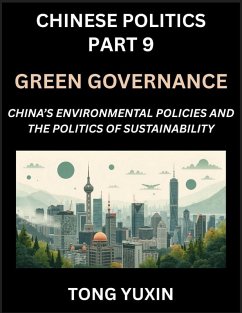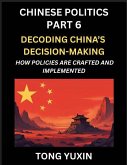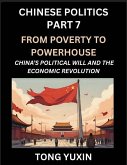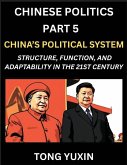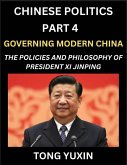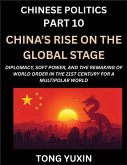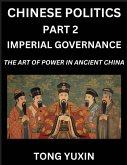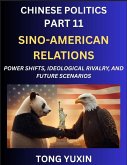China's meteoric rise as a global economic giant has come at a steep environmental cost. Cities like Beijing and Shanghai choke under smog (¿¿, wùmái), rivers run polluted, and ecosystems strain under the weight of industrialization. Yet amid this crisis, China has emerged as a paradoxical leader in green innovation, investing billions in solar panels and wind turbines while still burning coal at record rates. This book explores the heart of that paradox: "Green Governance" (¿¿¿¿, l¿sè zhìl¿)-the messy, often contradictory politics of balancing China's hunger for growth with the urgent need to protect its environment.At its core, this is a story about power. How does a one-party state (¿¿¿, y¿d¿ng zhì) known for prioritizing stability and economic targets reconcile those goals with the existential threat of ecological collapse? We delve into the corridors of Beijing's policymaking, where central directives (¿¿¿¿, zh¿ngy¿ng zh¿lìng) collide with local realities, and where phrases like "ecological civilization" (¿¿¿¿, sh¿ngtài wénmíng)-a signature idea of President Xi Jinping-are translated into laws, subsidies, and sometimes, sheer bureaucratic force.Take, for example, China's war on pollution. In 2013, when smog levels in Beijing spiked to 20 times the WHO's safe limit, the government responded not with public debate but with a top-down crackdown (¿¿¿¿¿¿¿, zìshàngérxià de zh¿ngzhì), shutting factories, banning coal, and even restricting car usage. Yet progress has been uneven. While air quality improved in some cities, others saw pollution merely shift elsewhere. Similarly, China's push for renewable energy-now the world's largest investor in clean tech-coexists with plans to expand coal production. These contradictions reveal a system where political will (¿¿¿¿, zhèngzhì yìyuàn) often trumps environmental logic.This book argues that China's environmental policies cannot be reduced to simple narratives of "authoritarian efficiency" or "green growth failure." Instead, they reflect a trial-and-error process (¿¿¿¿, shìcuò guòchéng) shaped by competing factions, public protests, and global pressures. We examine case studies ranging from river cleanup campaigns (¿¿¿¿¿¿, héliú zhìl¿ xíngdòng) to carbon trading markets (¿¿¿¿¿, tàn ji¿oyì shìch¿ng), revealing how policies are negotiated, resisted, and repackaged at every level.Ultimately, China's struggle with sustainability is a microcosm of the global challenge: how to rewire systems built on endless growth to prioritize planetary limits. As the world watches, China's choices-whether driven by crisis or calculation-will redefine not just its own future, but the fate of the Earth.
Bitte wählen Sie Ihr Anliegen aus.
Rechnungen
Retourenschein anfordern
Bestellstatus
Storno

